|
Multi-Stakeholder
Dialogue
|
|
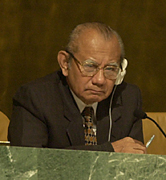  Chair Salim opened the first session of the multi-stakeholder
dialogue (MSD). He reminded participants of the history,
goals and methods that make the MSD a unique contribution
of the CSD to policy dialogue.
Chair Salim opened the first session of the multi-stakeholder
dialogue (MSD). He reminded participants of the history,
goals and methods that make the MSD a unique contribution
of the CSD to policy dialogue. |
| |
|
  Chief Ogunleye, speaking for women's organizations, reminded
participants that Agenda 21 recognizes
women as custodians of natural and human resources. She
noted that very few countries have ministries of women,
and, of the few that do, most lack the financial resources
to be effective promoters of women's rights. She expressed
surprise that the Secretary-General's report on progress
in implementing Agenda 21 was gender-neutral.
Chief Ogunleye, speaking for women's organizations, reminded
participants that Agenda 21 recognizes
women as custodians of natural and human resources. She
noted that very few countries have ministries of women,
and, of the few that do, most lack the financial resources
to be effective promoters of women's rights. She expressed
surprise that the Secretary-General's report on progress
in implementing Agenda 21 was gender-neutral.
|
| |
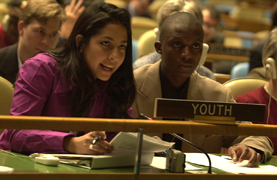  Youth representatives Linabel Segovia-Sarlat,
UNEP Youth Advisor for Africa, and
Shalala Oliver Sepiso, UNEP Youth Advisory Council from Mexican
Youth Environmental Network, lamented that most countries
lack effective processes to incorporate input from youth into
their policy development processes, voiced a demand that children
be recognized as a major group, and that children and youth
be given two hours at WSSD for their presentations and contributions.
Youth representatives Linabel Segovia-Sarlat,
UNEP Youth Advisor for Africa, and
Shalala Oliver Sepiso, UNEP Youth Advisory Council from Mexican
Youth Environmental Network, lamented that most countries
lack effective processes to incorporate input from youth into
their policy development processes, voiced a demand that children
be recognized as a major group, and that children and youth
be given two hours at WSSD for their presentations and contributions. |
| |
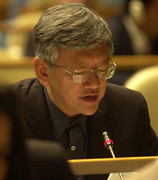
 Martin
Khor, speaking on behalf of NGOs, called for the principle
of common but differentiated responsibilities to be reviewed
and operationalized, similar to WTO's present exercise on
its principle of preferential trade status. He called for
a revival of the North-South deal, and a taming of the unfettered
forces of globalization. Martin
Khor, speaking on behalf of NGOs, called for the principle
of common but differentiated responsibilities to be reviewed
and operationalized, similar to WTO's present exercise on
its principle of preferential trade status. He called for
a revival of the North-South deal, and a taming of the unfettered
forces of globalization. |
| |
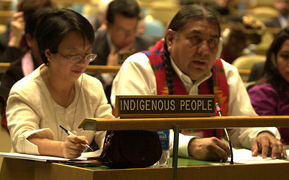  Indigenous
People's representatives Victoria Tauli Corpuz and Tom Goldtooth,
said that even with some laws in place to protect the rights
of indigenous peoples, poverty is still widespread, and
called on governments to work with indigenous peoples, not
against them.
Indigenous
People's representatives Victoria Tauli Corpuz and Tom Goldtooth,
said that even with some laws in place to protect the rights
of indigenous peoples, poverty is still widespread, and
called on governments to work with indigenous peoples, not
against them. |
| |
|
|
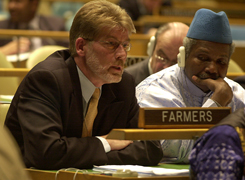  G.J. Doornbos, speaking for farmers, urged, inter alia,
stopping the drain of resources away from agriculture, mainstreaming
of sustainable agriculture, better organization, building
up capacity of farmers' organizations, strengthening market
power relative to other food chain partners, and strengthening
of family farm agriculture.
G.J. Doornbos, speaking for farmers, urged, inter alia,
stopping the drain of resources away from agriculture, mainstreaming
of sustainable agriculture, better organization, building
up capacity of farmers' organizations, strengthening market
power relative to other food chain partners, and strengthening
of family farm agriculture.
|
| |
|
|
|
|
| |
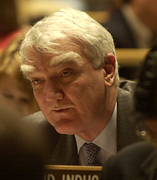  Mark
Moody-Stuart, Chairman, Business Action for Sustainable Development,
supported the idea that sustainable development is best achieved
through open, competitive, rightly-framed international markets
that encourage efficiency and innovation. He said the business
contribution to the eradication of poverty will come from
sectoral efforts in such fields as energy and transportation,
mining and natural resources, and water.
Mark
Moody-Stuart, Chairman, Business Action for Sustainable Development,
supported the idea that sustainable development is best achieved
through open, competitive, rightly-framed international markets
that encourage efficiency and innovation. He said the business
contribution to the eradication of poverty will come from
sectoral efforts in such fields as energy and transportation,
mining and natural resources, and water. |
| |
  Thomas
Rosswal, Executive Director, International Council for
Science, spoke on behalf of the Science and Technology
Community, said the new challenge is to develop scientific
understanding and technological options that address environmental,
economic and social aspects with a focus on local and
regional contexts.
Thomas
Rosswal, Executive Director, International Council for
Science, spoke on behalf of the Science and Technology
Community, said the new challenge is to develop scientific
understanding and technological options that address environmental,
economic and social aspects with a focus on local and
regional contexts.
|
| |
|
|

